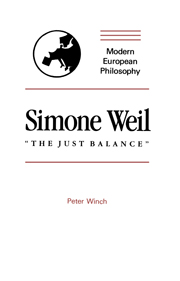Book contents
- Frontmatter
- Contents
- Acknowledgements
- 1 Introduction
- 2 The Cartesian background
- 3 The sensations of the present moment
- 4 “La simple perception de la nature est une sorte de danse”
- 5 Language
- 6 Necessity
- 7 Equilibrium
- 8 “Completely free action”
- 9 The power to refuse
- 10 “The void”
- 11 Geometry
- 12 Incommensurability
- 13 Beauty
- 14 Justice
- 15 “A supernatural virtue”?
- Notes
- Bibliography
- Index
12 - Incommensurability
Published online by Cambridge University Press: 05 February 2010
- Frontmatter
- Contents
- Acknowledgements
- 1 Introduction
- 2 The Cartesian background
- 3 The sensations of the present moment
- 4 “La simple perception de la nature est une sorte de danse”
- 5 Language
- 6 Necessity
- 7 Equilibrium
- 8 “Completely free action”
- 9 The power to refuse
- 10 “The void”
- 11 Geometry
- 12 Incommensurability
- 13 Beauty
- 14 Justice
- 15 “A supernatural virtue”?
- Notes
- Bibliography
- Index
Summary
The way in which, in “The Iliad or the Poem of Force,” Simone Weil speaks of force as “turning a man into a thing” is rhetorically very effective in its context; but there is something unfortunate about it, because it seems to class together very different sorts of case and is thereby likely to provoke doubts and objections which, though in a sense justified, are not in the end very relevant to what Simone Weil really wants to say. But because these difficulties are bound to arise, I must say something about them.
I have distinguished three aspects of “turning a man into a thing”?
(1) killing
(2) robbing the victim of the power to refuse
(3) robbing the victor, or oppressor, of the power to act rationally, making him or her act brutally, and so on (There are of course further distinctions that could be made here.)
Number (1) is perhaps the least problematic kind of case. We find it quite natural to speak of a corpse as a “mere thing” in trying to express its categorical difference from a living human being. But even this case has a good deal more to it than that. For certainly we tend to act very differently towards human corpses from the way we do towards anything else; consider funeral rites, for example. And if we found someone, except in circumstances of dire necessity, treating a human corpse as we might the carcass of an animal, say, without any sign of being aware that something was amiss, we might indeed think there was a deficiency in that person's understanding.
- Type
- Chapter
- Information
- Simone Weil: "The Just Balance" , pp. 147 - 163Publisher: Cambridge University PressPrint publication year: 1989



